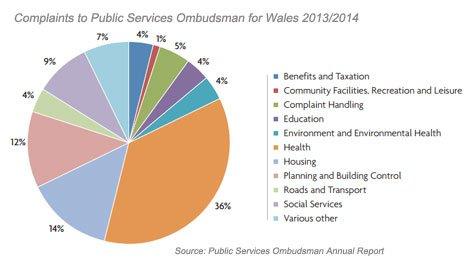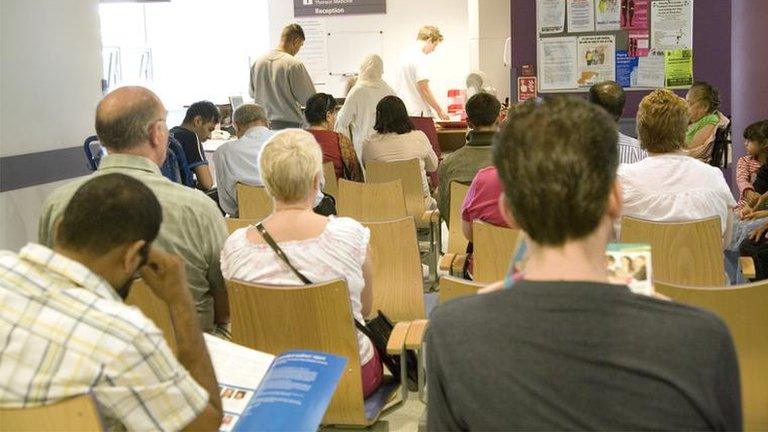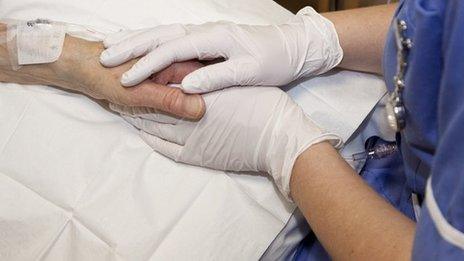NHS Wales: 'No blame culture' needed, says review
- Published

Welsh patients have written to MPs outlining the poor experiences they suffered
The Welsh NHS needs to develop a "no blame culture" to learn lessons from complaints, a review has recommended.
It also says patients need to be made more aware of how to complain and greater independence is needed in the handling of serious complaints.
The review, external, led by ex-Panasonic UK and Ireland boss Keith Evans, said some bodies and individuals must learn "how not to be defensive".
Welsh ministers welcomed the recommendations.
But Labour Cynon Valley MP Ann Clwyd, a persistent critic of Welsh NHS care standards, warned it would be "difficult to change the take it or leave it culture within NHS Wales".
The three-month review followed criticisms that the concerns of some patients and families were not being heard.
The report's recommendations and findings include:
a change in culture is needed to "genuinely learn" from people who have had difficult NHS experiences, including ensuring a "no blame culture"
Putting Things Right, a complaints system introduced in 2011, is "sound" but "variable" across NHS organisations
analysis of complaints and incidents needs a higher profile at NHS board level so information is used to improve services
a "national approach" to handling some concerns is needed, including bringing "more independence" into the process for more serious complaints
Mr Evans said NHS executives and senior staff should "lead the required change from the front and by good example".
"Furthermore, whatever job someone has in the NHS, they should think of themselves wearing their patients' shoes and put themselves in their position at all times," he said.
"Doing so will quickly reveal the daily issues of what is going right and wrong."
"It is also very important that organisations and individuals learn how to not be defensive but to listen to NHS users concerns and complaints, analyse them, and reflect the findings into the workplace quickly and efficiently for the betterment of all," he added.
'Complacency'
Ms Clwyd led a UK government-commissioned inquiry on how NHS hospitals in England handle complaints.
She has said she also received hundreds of letters from Welsh patients outlining poor experiences they had suffered.
But Welsh ministers said they could not be investigated because the complainants were anonymous.
Welcoming the review on Tuesday, Ms Clwyd warned it would be difficult to change the "take it or leave it culture within NHS Wales, and the lack of leadership which has led to complacency about listening to those who it is supposed to serve".
She is due to give evidence to the assembly's health committee on 16 July.
'Under siege'
Health Minister Mark Drakeford said handling complaints properly was "about culture as much as it is about resources".
"We need to do all we can to allow patients to put forward their concerns effectively and simply.
"At the same time we must not create a climate where staff feel under siege, as this report has found."
The Welsh government will respond formally to the review in the autumn.
The Conservatives warned some complaints may indicate "wider failings" in some parts of the health service requiring "immediate attention".
Shadow Health Minister Darren Millar repeated his call for a wide-ranging investigation into the Welsh NHS.
"Change in complaints handling is urgently required - but this review is no substitute for a Wales-wide Keogh-style review into standards of care," he said.

The NHS accounts for more than a third of complaints to the ombudsman
Figures show complaints about the Welsh NHS to the Public Services Ombudsman for Wales increased from 191 in 2006/7, when the office was created, to more than 750 in 2013/14.
Health culture
The acting ombudsman for Wales said in her annual report , externalthat the way health complaints were being handled featured prominently.
"It is the clear view of this office that it is not with the process itself that the problem lies," said Margaret Griffiths.
"Rather, it lays with the culture within health bodies and their attitude towards dealing with complaints."
In March, the complaints system for the NHS in England was described as "hopelessly complicated" and in need of an overhaul by a patients' watchdog.
- Published11 February 2014

- Published20 March 2014

- Published21 March 2014

- Published1 November 2013

- Published23 April 2014
